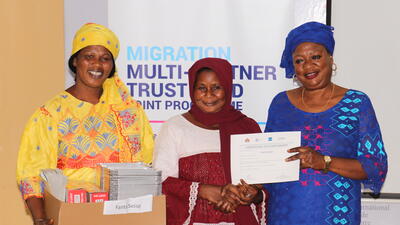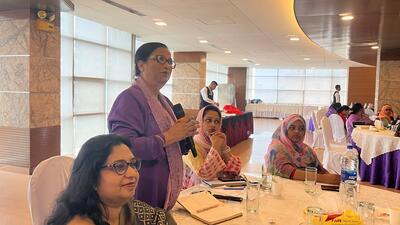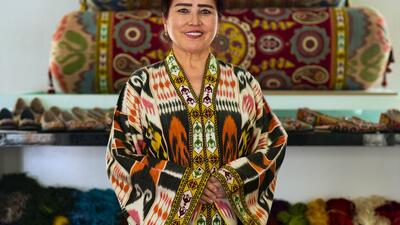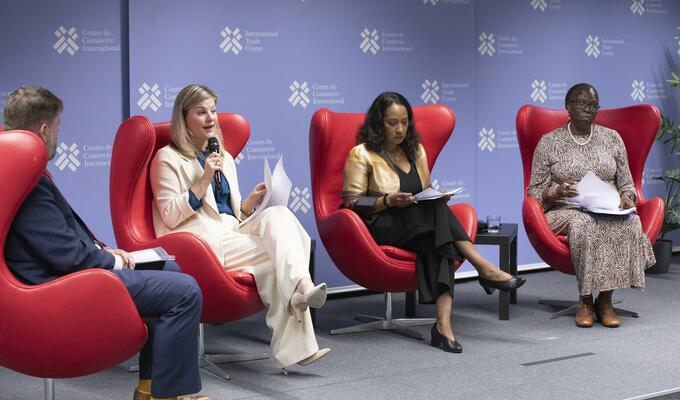
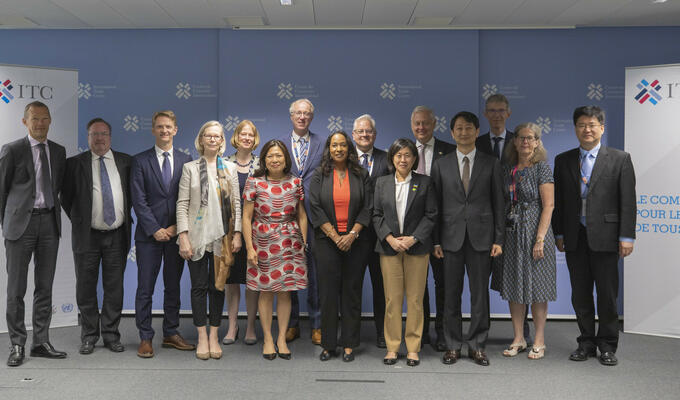
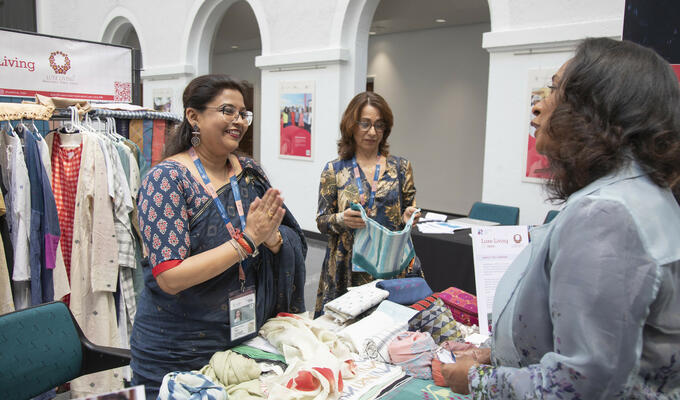
ITC @MC12
Businesses at the forefront of multilateral trade discussions
Before and during the World Trade Organization’s 12th Ministerial Conference (MC12), the International Trade Centre (ITC) championed the cause of small business, connectivity and inclusivity in global trade.
With Ministers convening in Geneva from across the world to review the multilateral trading system, ITC had the opportunity to discuss some of the matters that are at the heart its mission: women in trade and digitalization.
Below you will find a summary of the most important highlights of ITC @MC12:
AU Ministerial
Following the recent MoU with the African Union Secretariat and ahead of MC12, ITC Executive Director Pamela Coke-Hamilton addressed the African Union Ministerial in Geneva and reiterated the organization’s support to Africa in meeting its development objectives through the multilateral trading system.
She stressed the organization’s focus on supporting Africa, which represents 50% of ITC’s total expenditure.
She said that rebuilding from the aftermath of the pandemic, trade has a key role to play: “The continent is brimming with potential and offers unique opportunities to support inclusive and sustainable growth. According to ITC analysis, if all African countries fully liberalize tariffs, there is an untapped intra-African export potential of $22 billion in the current setting.”
Trade policy for women in business
As MC12 opened, leaders of WTO and ITC reaffirmed their trade policy commitment for women, while listening to the views of women entrepreneurs and business support champions in a special side event called: Unlocking Trade for Women’s Empowerment and Sustainable Development.
WTO Director-General Ngozi Okonjo-Iweala and ITC Executive Director Pamela Coke Hamilton joined women entrepreneurs from India, Indonesia, Nigeria and Rwanda, along with trade policy experts from around the world.
Coke-Hamilton distilled ITC’s decades-long experience working with small businesses into a story that illustrates the daily struggles of women entrepreneurs in developing countries: access to finance and information, restricted mobility, heavy caregiving duties. While trade policy and business support for women has improved, there is still a long road ahead.
“An ambitious and comprehensive approach is the only way to tackle the barriers faced by women in trade,” the ITC Executive Director said. “The Buenos Aires Declaration in 2017 provides the strategic direction in which we should head. ITC is working to translate these commitments into results that make a real difference to women everywhere.”
Coke-Hamilton called for three action points to join ITC in supporting women entrepreneurs through:
- Joining the SheTrades Outlook, which is a policy tool allowing 46 governments to make their policies work for women.
- Scaling up Aid for Trade for women, especially when it comes to digitalization, environmental sustainability, and regional value chains.
- Expanding multistakeholder collaborations to scale up interventions.
Small business, big in e-commerce
Initiatives to promote greater transparency and access to e-commerce have been high on the agenda at the WTO for several years. With the need to ensure a response to worsening economic conditions that could have severe consequences for small enterprises, the topic of facilitating ecommerce is receiving particular attention on the Ministerial agenda. To discuss the context and implications of the Joint Statement Initiative on ecommerce, ITC and the Netherlands hosted a high-level event at ITC centred on the implications for small businesses.
H.E. Liesje Schreinemacher, Minister for Foreign Trade and Development Cooperation of the Kingdom of the Netherlands, and Hon. Betty C. Maina, Cabinet Secretary at the Ministry of Industrialization, Trade and Enterprise Development in Kenya joined ITC Executive Director Pamela Coke-Hamilton in elaborating the concrete challenges that small businesses in developing countries face in the digital economy. The importance of trust for digital development closing the digital gap in Africa, especially for women, were some of the key points made in the opening remarks.
H.E. Schreinemacher highlighted the need to pursue digital policies that empower people and businesses: “We need to focus on the acquisition of digital skills and adequate regulatory frameworks to create a human-centered, sustainable and a more prosperous digital future.” She also mentioned the need to listen to the businesses themselves, to avoid top-down solutions and to build on very practical things that have already been negotiated, such as e-signatures and electronic contracts.
Coke-Hamilton emphasized that delivering on the promise of ecommerce could make trade agreements “real” instead of the “theoretical benefits of trade that have been promised developing countries for decades”. Small Island Developing States show a particular case: increased exchange with the rest of the world must be through better communications, which the internet has accelerated. “Small businesses need access to e-commerce and connectivity, and with access comes opportunity. To achieve this, collaboration and partnership are critical.”
Hon. Maina called for governments to provide the right policy framework for digital trade and e-commerce strategies in support of small businesses and that it is essential for more developing countries to take part in the discussion “Everybody needs to be at the table. If people do not know your needs, it is hard to make rules.”
Also joining the conversation was Moulaye Tabouré, co-founder and Chief Executive Officer of Anka, an e-commerce company that operates Africa’s largest “made in Africa” marketplace, Afrikrea.com in Côte d’Ivoire. He talked about opportunities he and others are creating to allow small businesses to trade everywhere through online platforms, including Facebook, Instagram, Whatsapp and TikTok. He recommended that policymakers collaborate closely with innovators who are already creating solutions to understand how they can be scaled: “We need solutions that can ingrain into digital platforms. Policymakers should take into account bottom-up lessons from already successful initiatives. This way trust can be reinforced.”
Breakfast dialogue among friends
ITC hosted a breakfast dialogue together with its partners from funding governments. ITC Executive Director Pamela Coke-Hamilton talked about the current challenging global trade context.
All participants agreed that Aid for Trade needs to break through the existing highly technical global trade rules and translate them into concrete trade opportunities for people on the ground. Participants saw ITC as the “missing link” between making rules and making trade a reality and encouraged ITC to continue tying small businesses from developing countries into global trade. Other topics touched on the need for close links with the private sector and the firm belief that trade can continue to serve as the principal mechanism to reduce poverty globally.
Expanding the ITC e-learning offering
ITC and the Institute of Export & International Trade signed a Memorandum of Understanding to further develop the educational offerings of ITC's SME Trade Academy, bringing higher education in international trade to those in need.
Signing on behalf of both organizations were ITC Deputy Executive Director Dorothy Tembo and Director General Marco Forgione, who re-confirmed their successful partnership that has already facilitated access to higher education in international trade in Ghana, Nigeria and Kenya. Both organizations are looking forward to continuing with the expansion of the level 4 diploma in international trade to other countries in Africa and exploring how to include important continental priorities such as the African Continental Free Trade Area into the curriculum.
Meeting delegations
Against the backdrop of the discussions and negotiations at the WTO, the ITC Executive Director, Deputy Executive Director and ITC directors had the opportunity to meet with over 40 delegations to share ITC’s strategic priorities and listen to their views on the needs of small businesses.









